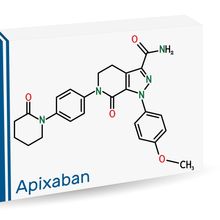clinical trials

Zymo Research & BluMaiden Biosciences Announce Partnership to Provide Clinical Trial Analytics and Reporting Services to the Pharmaceutical Sector
Zymo Research | Oct 2, 2024 | 2 min read
This partnership is poised to revolutionize clinical insights and decision-making for the pharma industry with the aim of enhancing therapeutic efficacy and commercial lifespan.

Advancing Clinical Research Through Effective Data Delivery
The Scientist and ICON | Apr 11, 2024 | 3 min read
Novel data collection and delivery strategies help usher the clinical research industry into its next era.

Precision Medicine-Based Biomarkers for Traumatic Brain Injury
The Scientist | Aug 8, 2023 | 1 min read
In this webinar, Dr. Kevin Wang will discuss a precision medicine approach for treating traumatic brain injury which uses phenotype biomarkers to monitor disease course and develop novel therapies.

Turning up the Heat on Brain Tumors
Aparna Nathan, PhD | Jul 17, 2023 | 3 min read
Oncolytic viruses can help glioblastoma respond to immunotherapy.

A Patient-First Approach to Clinical Trial Enrollment
The Scientist | Jun 27, 2023 | 2 min read
Discover how eConsent forms for clinical trial enrollment are the best path forward for patients, sites, and sponsors.

Electric Fields Disrupt Cancer Cell Division
Danielle Gerhard, PhD | May 4, 2023 | 5 min read
A novel, non-invasive treatment using electrical currents exploits physiological properties of dividing cancer cells to prolong survival and augment current therapies.

Real World Data: Opening New Avenues for Health Research
Liliana Garcia Mondragon, PhD | Apr 28, 2023 | 4 min read
Scientists and clinicians increasingly use real world data (RWD) to make valuable discoveries that can be applied to the healthcare industry.

Modulating the Immune Response to Vaccines
The Scientist | Apr 26, 2023 | 1 min read
Researchers uncover innovative natural approaches to fine-tune immunity from vaccination.

Enhancing Patient Participation and Experience with eConsent Forms
Medable | Feb 14, 2023 | 1 min read
Enhancing Patient Participation and Experience with eConsent Forms

Blood Thinner Ineffective for COVID-19 Patients: Study
Dan Robitzski | Nov 28, 2022 | 2 min read
A clinical trial finds that the anticoagulant apixaban, which has been prescribed to help COVID-19 patients recover, is ineffective and in rare instances dangerous.

European Medicines Agency Recommends Approving Takeda’s Dengue Vaccine
Katherine Irving | Oct 14, 2022 | 2 min read
In clinical trials, the new inoculation demonstrated greater protection for children and people older than 45 than the existing dengue vaccine.

Oxford-AstraZeneca Nasal COVID-19 Vaccine Falters in Clinical Trial
Dan Robitzski | Oct 11, 2022 | 2 min read
Researchers say they’re abandoning the project in its current form—one of several that aims to induce what’s known as mucosal immunity against SARS-CoV-2.

Birth of The Pill, 1956–1960
Andy Carstens | Oct 3, 2022 | 2 min read
Researchers overseeing the clinical trial for the first FDA-approved oral contraceptive claimed the drug gave the Puerto Rican participants power over their family planning. Critics claimed the women were exploited.

New Alzheimer’s Drug Slows Cognitive Decline in Clinical Trial
Dan Robitzski | Sep 28, 2022 | 2 min read
The Biogen-developed treatment, called lecanemab, appears to have a more clear-cut effect on slowing the disease than the company’s previous Alzheimer’s drug, Aduhelm.

Armored CAR T Cells Break Through Immune Suppression in Solid Tumors
Jennifer Zieba, PhD | Sep 26, 2022 | 3 min read
Researchers determined the safety and antitumor ability of genetically engineered CAR T cells that circumvent immune suppression in a prostate cancer phase I clinical trial.

Daily Multivitamin May Slow Cognitive Decline in Seniors
Andy Carstens | Sep 14, 2022 | 2 min read
Researchers caution that it’s too soon to recommend supplements based on the results of a new study.

Independent FDA Advisory Panel Recommends Approving ALS Drug
Amanda Heidt | Sep 8, 2022 | 4 min read
The group’s 7-2 ruling in favor of the therapeutic represents a shift from previous deliberations, in which data on its effectiveness was deemed insufficient.

Transform Clinical Trial Design to Prioritize Patients
Medable | Aug 26, 2022 | 1 min read
Discover how to decentralize clinical trials and assess patient health remotely.

NIH Fails to Enforce Rules for Reporting Clinical Trial Results
Amanda Heidt | Aug 18, 2022 | 3 min read
A review by the US Office of Inspector General found that only about half of the scientists running clinical trials funded by the NIH in 2019 and 2020 appropriately recorded their findings in a federal database, as is legally required.
